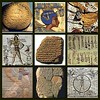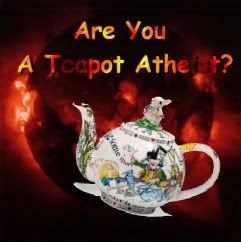"Teapot Atheists"
TRANSCRIPT:
Science can't disprove the existence of god but that does not mean that god exists. There are a million things we can't disprove. The philosopher Bertrand Russell had an analogy. Imagine there's a china teapot in orbit around the sun. You cannot disprove the existence of the teapot because its too small to be spotted by our telescopes. No one but a lunatic would say, "Well, I'm prepared to believe in the teapot 'cause I can't disprove it." Maybe we have to be technically and strictly agnostic, but in practice we are all teapot atheists.
But suppose that everybody in the society, the teachers, the tribal elders all had faith in the teapot. Stories of the teapot have been handed down for generations. It's part of the traditions of the societies, there are holy books about the teapot. Then, someone who said that they did not believe in the teapot, might be regarded as eccentric or even mad.
There's an infinte number of things like celestial teapots that we can't disprove. There are fairies. There are unicorns. Hobgoblins. We can't disprove any of those, but we don't believe in them anymore than nowadays we believe in Thor, Amon-Ra, or Aphrodite. We are all atheists about most of the gods that societies have ever believed in. Some of us, just go one god further.
LINKS:
"Take some more tea," the March Hare said to Alice very earnestly. "I've had nothing yet," Alice replied in an offended tone, "so I can't take more." ~Lewis Carroll, Alice in Wonderland
The Mad Hatter's "Unbirthday Teaparty"
teapot , teapot atheists , atheist , agnostic , youtube , bertrand russell , richard dawkins , beepbeepitsme




















26 Comments:
loved it! that's it in a nut shell...er tea pot. :)
Russell's Teapot is a brilliant argument. I believe this segment is from Dawkins' Root of all Evil which is a great analysis of the current state of Religion.
I'm not one to go one god further or one backward either. If belief in god makes some feel better that's okay by me. Just please don't tell me I have to do it to in order to feel better. I doesn't work for me to fool myself.
Kinda of arty in a weird way but a great argument. Thanks for the link!
Now look, I'm not clear, is that a weak teapot atheist or a strong teapot atheist? There is a difference you know according to some.
Well I'm short and stout does that make me an athiest?
BenedictXVI (not MY real name either)
Weak or stong doesn't matter, all teapot atheists will boil forever in the teakettle of eternity.
Let me guess: A weak teapot atheist says, "There might be a teapot out there, but the odds are so small as to be equivalent to zero."
A strong teapot atheist says, "All of the above, and since space is a vacuum, if it did exist, it would be empty. Therefore, there would be no point to its existence and no point in looking for it. Pass the jam."
RE benedict
I did consider finding a youtube presentation of "I'm A Little Teapot Short and Stout" and posting it with the article originally.
Just for the fun of it.
The valid comment being made by Darkins in this analogy is that if
we believed in things based purely on the inability to disprove them, then we should be prepared to believe everything and everything that our fertile imaginations can conjure up.
In other words, without a test or tests for veracity, everything is potentially true.
If everything is "true", then there is no model to explain the natural world, nor the "supernatural world."
In reality, we do not accept everything as true, as to do so would create in ourselves a state of intellectual paralysis.
Where everything is true because it cannot be disproved, the contraditions and inconsistencies which would arise from this position would just about blow our brains out of our respective ear canals.
For example:
It would be true that rain is the result of water density in cloud formations, plus it would be true that there is an invisible child on the clouds tipping a huge bucket of water onto the people below.
The child scenario would also have to be considered true based on the false premise that things are true if we cannot disprove them.
It would be true that the sun is 74% hydrogen, 25% helium, and some other trace elements AND that it is a lost cricket ball from an ancient game of cricket played by space aliens billions of years ago.
The latter would also have to be accepted as true if based on the incorrect premise that things are true because we cannot disprove them.
Obviously, it would be ludicrous and intellectually puerile to suggest that things are true because we cannot disprove them.
Damn my typos to Texas. DAWKINS!
... (the Sun) is a lost cricket ball from an ancient game of cricket played by space aliens billions of years ago.
Well that's just patently obvious.
And the Estate of ER Hubbard (Churhrch o' Sciontawledgy) holds the patent. {-;
Talkin' about scienmythology - has tom married his child bride yet?
Yes as Halden said I believe this segment is from Dawkins' Root of all Evil DVD. Excellent DVD. Highly recommend it. I like your blog BBIM. I linked here from KA's blog. Was scanning down through some of your previous topics and enjoyed the one concerning Plato. I learned quite a bit. Philosophy interests me very much. Regretably the only work of Plato I've read so far is "The death of Socrates". But give me time. Those greeks are so damn fascinating aren't they?
RE pasta
Yeah, Dawkin's "Root of All Evil" is still available on youtube, I think. I posted about it a while ago, but it might be worthwhile to repost the videos so more people get an opportunity to view them and make comment.
Damn! It took me a while to get to this one and now the clip isn't available anymore. Thanks for taking the time on the transcript Beep...:)
Now about the teapot. I suppose you consider this proof but really, and as I've mentioned here before, this herasy about it orbiting the sun really must stop. You know full well it orbits pluto. It must because it says so in the book I'm writing about it!
RE ted
Thanks for letting me know that the video wasn't working. You should be able to view it @ onegoodmove. The link is on the article.
Works a treat. Thanks again Beep...:)
The teapot argument is an equivalent expression of the argument that the following sentence expresses a logically invalid argument form, which is a logical fallacy known as the argument from ignorance:
There is no evidence or proof for ¬X. Therefore X
However there are propositions - lets generally cal call any one of twhere there is no evidence or proof for them or their negation. Call any of these y, hence it's negation is ¬y. Then if the above argument form was valid we would have to conclude
There is no evidence or proof for ¬y. Therefore y
There is no evidence or proof for ¬¬y. Therefore ¬y
Hence we would have to believe in y and ¬y and hence we would have a contradictory set of beliefs.
Hey pola, welcome back. I tried posting to your blog. Bit zilch results.
Dawkins and Russell are weak atheists. Neither advance positive knowledge claims regarding the non-existence of deities. Both hold, at the same time, that the fact that "Science can't disprove the existence of god does not mean that god exists."
The celestial teapot analogy, then, is an argument for weak atheism. And insofar as I am a weak atheist, ich bin ein Teapot Atheist!
Strong atheists, on the other hand, could not feasibly be described as Teapot Atheists. Weak/Teapot Atheists operate within the realm of what can be demonstrated by the evidence. Strong atheists, like their theistic counterparts, operate in the realm of what the evidence does not or cannot demonstrate. Strong atheists, like their theistic counterparts, make a leap of faith, and therefore cannot reasonably be described as Teapot Atheists. "Tinpot Atheists," yes. "Kindergarten Atheists," certainly. But they are no Teapot Atheists. ;)
RE arthur:
My understanding is that Dawkins says that he cannot claim that god/gods do not exist, which is realistic as I am sure he wouldn't claim to be omniscient, same as I wouldn't.
On the otherhand, there are gods whose existence could be said to be extremely unlikely in the philosophical sense, as their attributes/characteristics are internally inconsistent.
I don't have any intellectual problems with people calling themselves, weak atheists, strong atheists, agnostic atheists, or agnostics.
I think of myself as being an agnostic atheist as I don't believe that anyone can "know" of the existence of a god (certainly not in the same way that we know of plants, animals, the planets etc), and I don't claim to know of a god either.
So I am agnostic in that sense. I am also an atheist, as I don't believe in the existence of god/gods either. But I don't make the ultimately strong claim and deny the existence of god/gods.
Whichever appellation people choose, they are skeptical of god claims. So, bring on the skeptics! :)
I dont believe the teapot argument is an argument for the rationality of weak atheism, but is an argument against a particular instance of the logical fallacy of the appeal to ignorance of the instance:
There is no evidence against the existence of God. Therefore God exists.
provided the inference used from premiss to conclusion is the fallacy of the argument from ignorance : there is no evidence for X .Therefore ¬X (Here X= God doesn't exist, and hence ¬X= God exists)
Further I dont believe that a weak atheist should be defined as a person who is an atheist and doesn't believe that any deities dont exist, since it's possible that some weak atheists have incompatible property arguments for the nonexistence of specific deities.
As for the rationality of strong atheism, I cant see how anyone would claim that no deities exist, if that's how strong atheism is defined,except if all deities considered are supernatural and there is an argument for the nonexistence of the supernatural. I dont know of any such argument although of course I could be ignorant and there is one.
I consider myself to be an agnostic (lacks knowledge in the existence of any deity), weak atheist but I know that some deities dont exist namely the ones with specific incompatible properties. However that doesnt imply Im a strong atheist since I dont have any arguments for the nonexistence of all deities.
Amen!
RE pola:
I think you might actually agree with Dawkins. He has stated something similar - to the effect that he cannot say that the gods do not definitely exist, but there is a high probability that they don't.
And that he doesn't believe they exist.
Post a Comment
<< Home